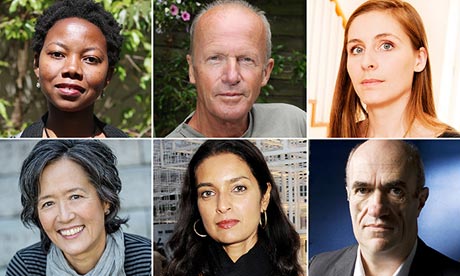Allowing US writers entry into the UK's most prestigious prize spells disaster, says Philip Hensher

This year's Booker prize shortlist … clockwise from left: NoViolet Bulawayo, Jim Crace, Eleanor Catton, Colm Toibin, Jhumpa Lahiri and Ruth Ozeki
When the news that the Man Booker prize is to be opened up to the vast and dominant fields of the American novel broke this week, I heard of a well-known London agent who remarked succinctly: "Well, that's the end of the Booker, then." When eligibility shifts from the UK, Commonwealth, Ireland and Zimbabwe to English-language novels published in the UK, it is hard to see how the American novel will fail to dominate. Not through excellence, necessarily, but simply through an economic super-power exerting its own literary tastes, just as the British empire imposed the idea that Shakespeare was the greatest writer who ever lived throughout its 19th-century colonies. The tendency was already at work in this year's Booker shortlist, where a superficial multicultural aspect concealed a specifically North American taste. Jhumpa Lahiri's Lowland had fascinatingly airport-bestseller features, including the favourite trope of two brothers divided by the currents of history. NoViolet Bulawayo's We Need New Names dutifully covered all the external and societal concerns about African society that a creative writing student, or a devoted viewer of CNN's nightly special, might believe significant – NGO, exorcisms, corruption, the plight of the white Africans, etc. Ruth Ozeki's novel about Japan, A Tale for the Time Being, covered the cute aspect, the Salaryman aspect, the Buddhist aspect, the suicide aspect and so on in approved Murakami-esque tones.
Curiously, all these novels, effectively written by American-based authors about exotic places, were unable to do so without placing the exotic places in the reassuring context of an American suburb. The novel written by an Indian, living in India, about India, without reference to his later life in Cincinnati was dead this year. From next year, the floodgates open, and we can expect never to hear again from an Indian novelist.
The Commonwealth Writers' prize provides a cautionary tale: in 2011, they made the decision to stop the main prize, and just continue with a first novel prize. Two years later, this was abolished, too. All that remains of a once very useful prize is a short story competition to which nobody pays the slightest attention, and which, in 17 years, nobody of the slightest reputation has ever won.
The Booker has done a great deal of good in its 45 years. It has given novelists from a huge range of national traditions a wider readership, and has done so by its limits. It is just about confined enough in scope to allow every judge to read every book submitted – the year I judged the prize, in 2001, it was about 120 books in total, which was probably not far from the upper limit of possibility. Reading all the books gives the judges real freedom of movement apart from conventional taste. A prize that hands over a large part of the reading to a pre-reading panel, or that divides up the reading between judges, instantly loses a large part of its authority. I spoke to AS Byatt, who won the prize in 1990 for Possession. She made an important point about what will happen when the number of submissions increases next year. "The Booker prize is the only book prize that doesn't sift – odd things crop up. It's a major undertaking, every judge reading everything. This will no longer be possible."
More
Curiously, all these novels, effectively written by American-based authors about exotic places, were unable to do so without placing the exotic places in the reassuring context of an American suburb. The novel written by an Indian, living in India, about India, without reference to his later life in Cincinnati was dead this year. From next year, the floodgates open, and we can expect never to hear again from an Indian novelist.
The Commonwealth Writers' prize provides a cautionary tale: in 2011, they made the decision to stop the main prize, and just continue with a first novel prize. Two years later, this was abolished, too. All that remains of a once very useful prize is a short story competition to which nobody pays the slightest attention, and which, in 17 years, nobody of the slightest reputation has ever won.
The Booker has done a great deal of good in its 45 years. It has given novelists from a huge range of national traditions a wider readership, and has done so by its limits. It is just about confined enough in scope to allow every judge to read every book submitted – the year I judged the prize, in 2001, it was about 120 books in total, which was probably not far from the upper limit of possibility. Reading all the books gives the judges real freedom of movement apart from conventional taste. A prize that hands over a large part of the reading to a pre-reading panel, or that divides up the reading between judges, instantly loses a large part of its authority. I spoke to AS Byatt, who won the prize in 1990 for Possession. She made an important point about what will happen when the number of submissions increases next year. "The Booker prize is the only book prize that doesn't sift – odd things crop up. It's a major undertaking, every judge reading everything. This will no longer be possible."
More
No comments:
Post a Comment